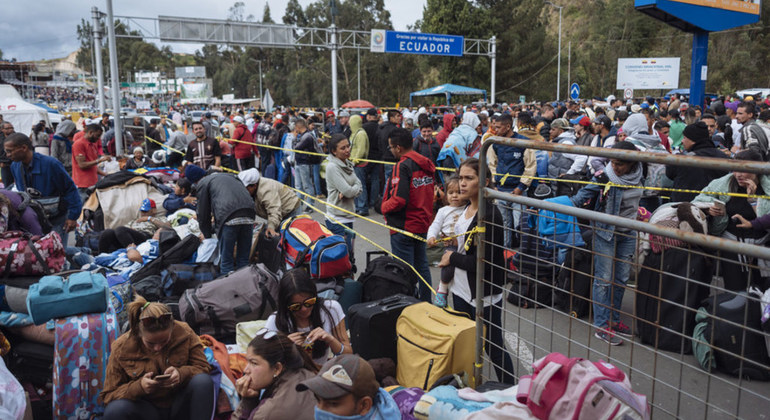UN, global health agencies sound alarm on drug-resistant infections; new recommendations to reduce ‘staggering number’ of future deaths
Deaths caused by infections from antibiotic-resistant bacteria will skyrocket over the next two decades, along with huge economic costs, without immediate, ambitious and coordinated action, the UN World Health Organization (WHO) and partners warned on Monday.
According to a groundbreaking report, the UN Ad hoc Interagency Coordinating Group on Antimicrobial Resistance warned that if no action is taken, drug-resistant diseases could cause 10 million deaths each year by 2050 and damage to the economy as catastrophic as during the 2008-2009 global financial crisis. By 2030, antimicrobial resistance could force up to 24 million people into extreme poverty.
Read our full report here.
‘Continuing absence’ of political solution to Israel-Palestine conflict ‘undermines and compounds’ UN efforts to end wholesale crisis
The UN is “continuing to address the humanitarian, economic and political crisis in the Occupied Palestinian Territory” but efforts are continually undermined by the lack of any political progress towards a two-State solution, said the head of UN Political and Peacebuilding Affairs (DPPA) on Monday.
Rosemary DiCarlo was briefing the UN Security Council on the latest situation in the Middle East and said hopes for two States living side by side in peace, “continue to be replaced by the rising fears of future annexation. The possibility of establishing a viable and contiguous Palestinian State continues to be eroded by facts on the ground.”
Find our coverage of the Security Council meeting here.
Some 300,000 Venezuelan children in Colombia need humanitarian assistance; UNICEF looks to boost response funding
Without increased support, the health, education and well-being of at least 327,000 children from Venezuela living as migrants and refugees in Colombia will be in jeopardy, the UN Children’s Fund (UNICEF) warned on Monday.
“At a time when anti-migrant sentiment is growing worldwide, Colombia has generously kept its doors open to its neighbors from Venezuela,” said Paloma Escudero, UNICEF Director of Communication who has just finished a four-day visit to Cúcuta, on the Colombian side of the border with Venezuela.
Find the complete story here.
Civilian needs ‘urgent’ amid Tripoli airstrikes, clashes
To Libya now, where civilians are trapped by fighting around the capital, Tripoli, and access to food is “becoming a greater challenge”, the UN humanitarian coordinating office (OCHA) has said. The violence comes after years of instability that have followed the overthrow of President Muammar Gaddafi in 2011, with the UN-recognized Government of National Accord under assault from forces loyal to military commander Khalifa Haftar.
On Monday morning, Ghassan Salamé, Special Representative of the UN Secretary-General and Head of the UN Support Mission in Libya, told French radio that the fighting had reached a “military stalemate” and the frontline had barely moved since General Haftar’s offensive began, three weeks ago.
In an appeal for humanitarian shipments to Libya to be speeded up to meet “urgent” needs, OCHA said that indiscriminate shelling and rocket attacks have continued.
Airstrikes were also reported at the weekend, impacting residential areas in Ain Zara and Al Twaisha, with unconfirmed reports of at least one civilian death, as well as damage to people’s homes. According to the World Health Organization (WHO), the fighting has claimed 345 lives and injured more than 1,650. Of that number, 96 civilian casualties have been confirmed: 22 dead and 74 wounded, while some 40,000 people have now fled the fighting, which began 24 days ago.
Hatred ‘a threat to everyone’, urges Guterres calling for global effort to end xenophobia and ‘loathsome rhetoric’
A “disturbing groundswell” of hate-based violence and intolerance aimed at religious devotees across all faiths, must be countered soon before it’s too late, the United Nations Secretary-General said on Monday, noting murderous attacks in just the past few days on a synagogue in California, and a church in Burkina Faso.
“Such incidents have become all-too-familiar” said António Guterres, citing “Muslims gunned down in mosques, their religious sites vandalized; Jews murdered in synagogues, their gravestones defaced with swastikas” and Christians “killed at prayer, their churches often torched.”
Instead of being safe havens, houses of worship have become targets, he warned, noting that “beyond the murders, there is loathsome rhetoric: xenophobia aimed not only at religious groups but also at migrants, minorities and refugees…venom directed at anyone considered the ‘other’”.
Read the full story here.








